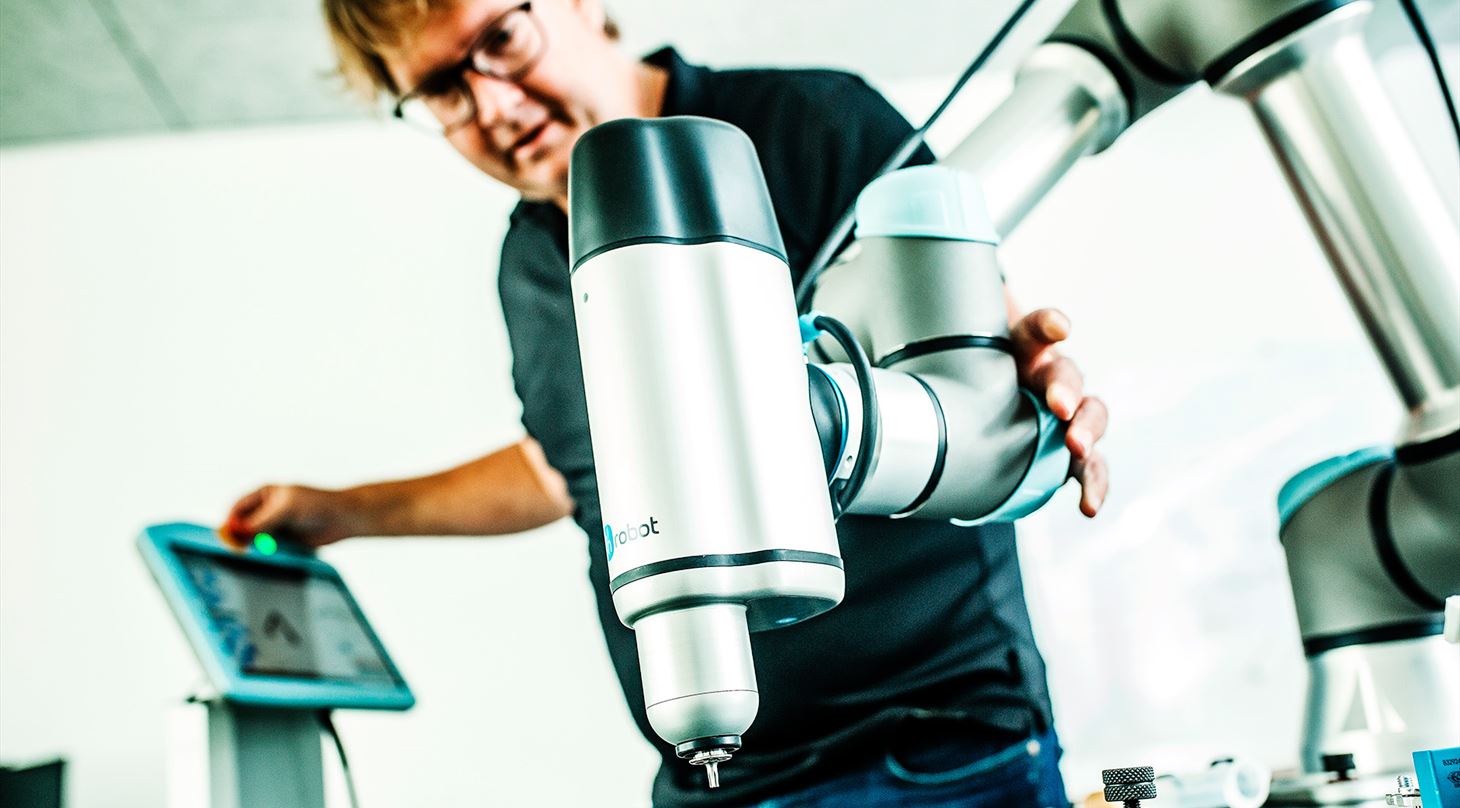
Businesses miss out on robot gains: New effort to pave the way for more cobots
The efficiency of the production line, cost reduction, increased quality and job satisfaction - the benefits of implementing a collaborative robot, for example in a manufacturing company, are many. Even so, companies are hesitant to invest in a digital helping hand because they lack knowledge about the opportunities that robots provide. New efforts must change that.
More efficiency, higher quality level, and less waste.
These are just some of the benefits companies can gain from implementing a collaborative robot – also called a cobot.
14th June 2023 saw a new effort, EDOcobot, being launched in Odense, to encourage more companies to get a cobot. EDOcobot is a collaboration between the Danish Technological Institute (DTI), Erhvervshus Fyn, Odense Robotics as well as the Southern Denmark EU Office, and the Enterprise Europe Network. It was launched to improve robot skills and spread the use of collaborative robots in small and medium-sized production and logistics companies.
The aim is to increase efficiency and productivity and generally raise the digital level of companies --because there is good reason to implement collaborative robots in production, as Taasinge Elementer will confirm. Taasinge Elementer produces wooden elements for the construction industry. They invested in a cobot which, after some settling in, now fills insulation in the wooden elements and cuts and nails in sheet materials with great accuracy.
It doesn't stop at any point, and it doesn't need lunch or toilet breaks. The only thing it requires is an operator with whom it can "cooperate", so that it always knows what to do.
- Filling the wooden elements with insulation is a time-consuming and troublesome task, and at the same time the sheet materials are heavy and the process of handling them is not particularly ergonomic for our employees. So, the robot helps our employees and creates a much better working environment. At the same time, we produce far more than before – with our usual five men on the production line, we produce as much as nine men could, says Alexander Laning, Head of Business Optimization at Taasinge Elementer.
- It can be a huge challenge to know where to start. That's why I'm looking forward to seeing how the EDOcobot project can help more companies get started on their automation journey, he adds.
He does not doubt that the cobot solution has given Taasinge Elementer a boost and the implementation process has opened new opportunities for further automation, which he plans to pursue in the coming years.
Missing out on big wins
But even though many companies would like to automate workflows and processes like Taasinge Elementer, there are many challenges and barriers associated with realising that desire.
In a survey carried out by DTI, almost 40 percent of the companies surveyed that do not use robots today say that they simply lack knowledge about the possibilities for automation. Many companies also lack the skills.
The survey also indicated that a significant proportion of companies understand they are missing out on opportunities for, e.g., streamlining their production line -- because they do not use robots.
- The first robot is almost always the most difficult to implement. There is therefore a need to give companies a helping hand to get started. To clarify the company's real needs and carry out concrete experiments together with impartial robot specialists before investing in equipment, says Jacob Kortbek, who is a Vice Director at DTI.
At Erhvervshus Fyn, which is responsible for the EDOcobot project, it is seen as a necessity that more production and logistics companies automate.
- It is not only about the individual company's development and growth. It is about lifting a whole group of companies so that they create attractive workplaces with specialised jobs and high-quality products, so that we ensure the international competitiveness of Danish manufacturing companies. In the end, it means growth and welfare for Denmark, so we have big ambitions with EDOcobot, says Kasper Aagaard, Director of development, financing, and EI at Erhvervshus Fyn.
Facts about EDOcobot
EDOcobot is a project that aims to spread the use of collaborative robots in small and medium-sized production and logistics companies to increase efficiency and productivity and generally raise the digital level.
An EDOcobot course starts by assessing the company's digital maturity level (Digital Maturity Assessment - DMA), the company's needs and the potential for implementing a cobot solution.
Depending on the outcome of the DMA, the company is given the opportunity to, for example:
Test Before Invest
Test possible solutions for your production line in our test facilities at DTI.
Funding
Consultancy and insight into both domestic and foreign financing options for your investment in collaborative robots
Network and Innovation
Access to relevant networking and innovation courses and events, depending on your level of digital maturity.
EDOcobot is part of the European Digital Innovation Hub Odense (EDIH Odense) and one of more than 150 EDIHs in Europe.
EDOcobot is offered by Erhvervshus Fyn, which is the coordinator, in collaboration with DTI, Odense Robotics and the Southern Denmark EU Office (SDEO) and Enterprise Europe Network (EEN).
EDIH Odense and EDOcobot are co-financed by the European Union and the Danish Board of Business Development. However, the views and opinions expressed are solely those of the author and do not necessarily reflect those of the European Union or Danish Board of Business Development. Neither the European Union nor Danish Board of Business Development can be held responsible for them.